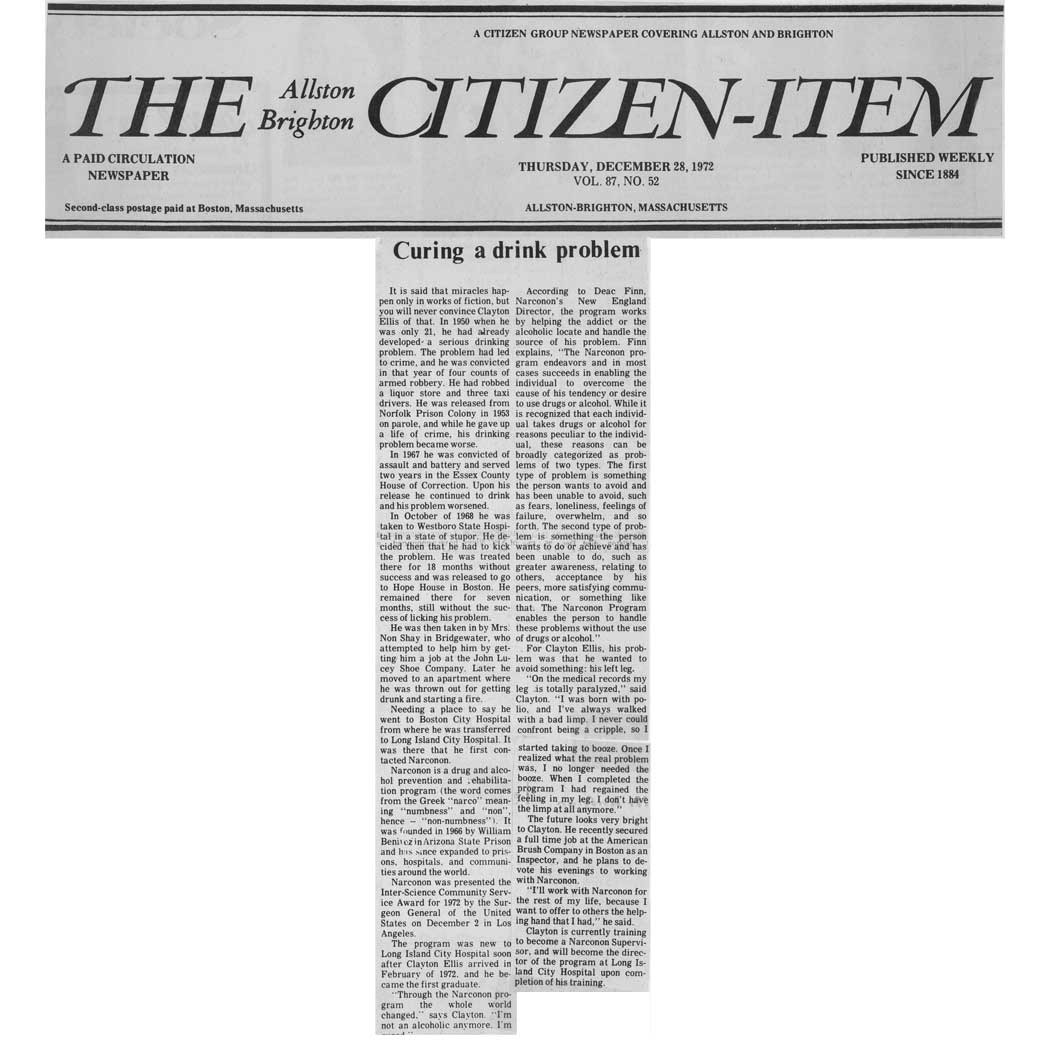Curing A Drink Problem

The Citizen-Item December 28, 1972
It is said that miracles happen only in works of fiction, but you will never convince Clayton Ellis of Cambridge of that. In 1950 when he was only 21 years old, he had already developed a serious drinking problem. The problem had led to crime, and he was convicted in that year of four counts of armed robbery. He had robbed a liquor store and three taxi drivers. He was released from Norfolk Prison Colony in 1953 on parole, and while he gave up a life of crime, his drinking problem became worse.
In 1967 he was convicted of assault and battery and served two years in the Essex Country House of Correction. Upon his release he continued to drink and his problem worsened.
In October of 1968 he was taken to Westboro State Hospital in a state of dead stupor. He decided then that he had to kick the problem. He was treated there for eighteen months without success and was released to go to Hope House in Boston. He remained there for seven months, still without success in licking his problem.
He was then taken in by Mrs. Non Shay in Bridgewater, who attempted to help him by getting him a job at the John Lucey Shoe Company. Later he moved to an apartment where he was thrown out for getting drunk and starting a fire.
Needing a place to stay, he went to Boston City Hospital where he was transferred to Long Island City Hospital in Quincy at his request. It was there that he first contacted Narconon.
Narconon is a drug and alcohol prevention and rehabilitation program (the word came from the Greek “narco” meaning “numbness” and “non,” hence - “non-numbness”). It was started in 1966 in Arizona State Prison and has since expanded to prisons, hospitals, and communities around the world.
Narconon was presented the Inter-Science Community Service Award for 1972 by the Surgeon General of the United States on December 2 in Los Angeles. Accepting the award was Mark Jones (Lt. Col. U.S.M.C. Ret.), National Director of Narconon.
The program was new to Long Island City Hospital soon after Clayton Ellis arrived in February of 1972, and he became the first graduate.
“Through the Narconon program the whole world changed,” says Clayton. “I’m not an alcoholic anymore. I’m cured.”
According to Deac Finn of Milton, Narconon’s New England Director, the program works by helping the addict or the alcoholic locate and handle the source of his problem. Finn explains, “The Narconon program endeavors and in most cases succeeds in enabling the individual to overcome the cause of his tendency or desire to use drugs or alcohol. While it is recognized that each individual takes drugs or alcohol for reasons peculiar to the individual, these reasons can be broadly categorized as problems of two types. The first type of problem is something the person wants to avoid and has been unable to avoid, such as fears, loneliness, feelings of failure, and so forth. The second type of problem is something the person wants to do or achieve and has been unable to do, such as greater awareness, relating to others, acceptance by his peers, more satisfying communication, or something like that. The Narconon Program enables the person to handle these problems without the use of drugs or alcohol.”
For Clayton Ellis, his problem was that he wanted to avoid something: his left leg.
“On the medical records, my leg is totally paralyzed,” said Clayton. “I was born with polio, and I’ve always walked with a bad limp. I never could confront being a cripple, so I started taking to booze. Once I realized what the real problem was, I no longer needed the booze. When I completed the program, I had regained the feeling in my leg. I don’t have the limp at all anymore.”
The future looks very bright for Clayton. He recently secured a full-time job at the American Brush Company in Boston as an inspector, and he plans to devote his evenings to working with Narconon.
“I’ll work with Narconon for the rest of my life, because I want to offer to others the helping hand that I had,” he said. “I like working with these people, and I hope to get a few sober people out of it. It’s the best thing that happened to me and I’d like to see it continued.”
Clayton is currently training to become a Narconon Supervisor, and will become the director of the program at Long Island City Hospital upon completion of his training.
More Articles from 1972: